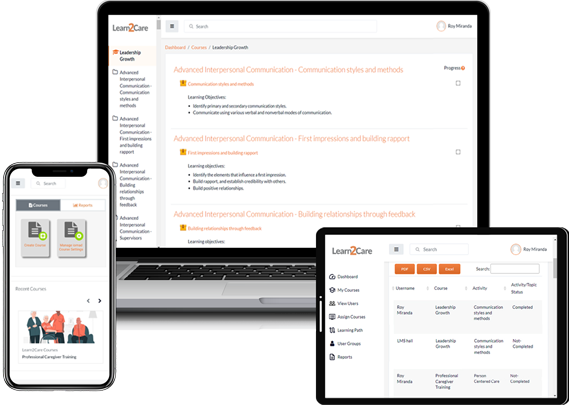
State Recommended
Courses

Caregiver
Training
Certification
Online
Courses
Hours of
Online
Content

Leadership
Courses
Title: Homemaker
Min. Initial Training Hours: 40
Ongoing Training Hours: 6
State-Specific Curriculum Criteria: Yes
Title: Personal Care Attendant
Min. Initial Training Hours: 60
Ongoing Training Hours: 6
State-Specific Curriculum Criteria: Yes
In Massachusetts, caregiver training varies based on the type of services provided, with strict state regulations ensuring caregivers possess necessary skills.
Note: We are committed to helping you stay informed and confident in your compliance efforts with the most accurate, up-to-date guidance we can provide. Our guides and resources are designed to support your training and compliance work, though state regulations may vary and change frequently. Please consult your state’s licensing or regulatory body for official guidance, publications, or requirements.

In Massachusetts, the senior population aged 65 and over is projected to reach 1.5 million by 2030, with nearly 20% requiring some care. This forecast highlights a 33% increase in caregiver demand by that time.
To address this rising need, Massachusetts prioritizes high-quality and accessible caregiver training. As a result, the state enforces stringent regulations for caregivers and agencies:

Licensure
Massachusetts care settings undergo rigorous licensing processes overseen by key agencies such as the Massachusetts Executive Office of Elder Affairs, Department of Labor Standards, and Executive Office of Health and Human Services (EOHHS).

Caregiver Training
Whether individuals serve as Homemakers, Personal Care Aides, Supportive Personal Care Aides, or Home Health Aides, their training requirements vary. Each role necessitates specific skills and knowledge, reflected in the duration of their initial training programs, which range from 40 to 87 hours.
Certification & Continuing Education
Upon successful completion of training, caregivers receive certificates. It’s important to note that continuing education remains crucial to keep caregivers updated on best practices and evolving standards.

Exemptions
Certain professionals, such as Registered Nurses and Physical Therapists, are exempt from caregiver training requirements.
Ready to answer Massachusetts’ call for caregiving? Join the wave of compassionate caregivers and agencies making a difference in the lives of seniors.

Equip caregivers with essential skills tailored to your agency's needs. Upskill administrators, managers, and office staff in leadership, communication, and team management.

230+ online caregiver and leadership training courses, with over 185 engaging hours of content to effectively equip and train your caregivers and home care agency staff.

Create personalized learning journeys, tailoring training to specific roles and expertise areas such as Alzheimer's and dementia care, infection control, and restorative care.

Easily track and report on assignments, completion status, quiz scores, and the individual caregiver's overall progress with our Progress Monitoring system.

Equip your caregivers with content that adheres to the US CMS HHA Conditions of Participation for home health aide services.

Upload your own training materials or empower your team to access built-in courses, streamlining essential training in one accessible location.

Experience seamless on-the-go learning for caregivers, providing unmatched flexibility in diverse work environments.
Homemaker: 40 hours initial + 6 hours ongoing annually.
Personal Care Attendant: 60 hours initial (20 PC + 40 HM) + 6 hours ongoing annually.
The Homemaker and Personal Care Training in Massachusetts covers topics like HIV/AIDS, infection control, confidentiality, client care best practices.
SHCAs must complete an 87-hour training, including 75 hours of Home Health Aide (HHA) course and 12 hours specific to SHCA responsibilities. This training covers personal care, homemaking, and emotional support for consumers with Alzheimer's Disease/Dementia or behavioral issues.
Here are the benefits of training certification for agencies and caregivers:
Overall, certification signifies a dedication to professionalism and high-quality care, enhancing your client's trust in your abilities.